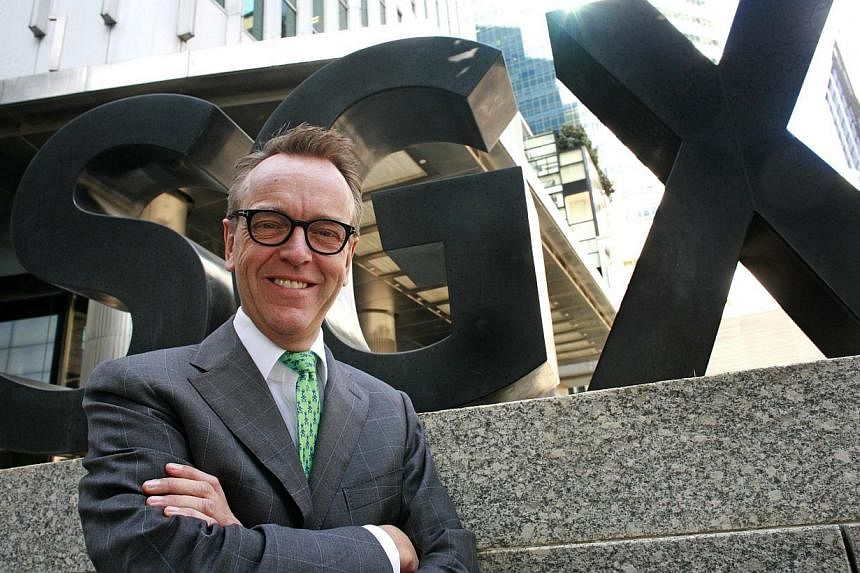SINGAPORE (Bloomberg) - Singapore Exchange (SGX) will hire more people in China as it seeks to sell more of its products in Asia's largest equities market, Chief Executive Officer Magnus Bocker said.
SGX will appoint a senior executive in China to build its business and relationships, Bocker said in an interview on Jan. 29.
The bourse posted its first quarterly profit growth in more than a year in the last three months of 2014 after a world-beating rally in Chinese stocks spurred demand for hedging instruments. Revenue from derivatives jumped 46 per cent, spurred by a 183 per cent surge in volume on Chinese stock futures, according to the exchange.
SGX wants more global investors to use its Chinese products, "whether it's China A50, indices or commodities," Bocker, 53, said at SGX headquarters. "We need to grow our headcount in China. We will more than double what we have today in the next few years."
Bocker said SGX's future performance will depend on its ability to attract new clients and sell more products to existing customers, emphasizing the need to have a presence in key markets. The bourse has sales and marketing offices in Beijing, Hong Kong, Tokyo, Mumbai and London. Longer term, the exchange will look at opportunities to tap North America, the world's biggest derivatives market, Bocker said.
"The number of new clients using our products is very high and we're not losing the old ones," Bocker said.
Derivatives transactions climbed 52 per cent to 40 million in the fiscal second quarter, with trading of FTSE China A50 futures increasing to more than 17 million contracts, according to SGX. China A50 contracts, which track the country's 50 biggest stocks, along with those for Japan, India and iron-ore, are among SGX's most actively traded derivatives.
There are about 40 companies seeking approval from the U.S. Securities and Exchange Commission to introduce exchange-traded funds that will invest in the mainland China stock market and these ETF providers would be potential clients of China A-50 futures, Bocker said.
"The derivatives success happened over a number of years where we have increased distribution, setting up offices in London, Tokyo, Hong Kong and India," Bocker said. "The importance of distributing the product is growing in our industry and we need to be a leader in that. You should expect us to be present in more locations going forward."
SGX plans to start a bond trading platform by the middle of this year, to complement its equities, commodities and foreign-exchange products.
"We don't have an international bond market in Asia," Bocker said. "The investors that we meet are looking for quotes that are cross-border. We believe that SGX can play a much stronger role in the fixed-income market."
To strengthen its derivatives business, SGX said last month it will increase technology-related spending by $20 million to as much as $75 million this year as it accelerates the upgrade of its trading and clearing platform. This would enable the bourse to handle more derivatives transactions and operate on a 24-hour basis by the end of 2016. The exchange currently trades equity-index and commodities futures for more than 18 hours on weekdays.
"The outlook for derivatives is looking very bright," said Benjamin Ong, an analyst at Phillip Securities. "Demand for China A50 remains strong given the positive interest in China equities."
The bourse decided to upgrade its platform after suffering its second trading disruption in less than a month in December, prompting the Monetary Authority of Singapore to say it will take supervisory action against SGX if needed. An independent committee formed to investigate the incident will probably submit its findings in March.
"It's our job to keep the markets open," Bocker said. "Any disruption is very serious for us. We need to really learn from that."
The Singapore bourse is seeking to attract investors to a broader range of asset classes as appetite for trading shares in the city-state stagnates. While derivatives accounted for 39 per cent of revenue in the last quarter, up from 32 perc ent a year earlier, cash-equity trading remains an important business for SGX, Bocker said.
Last month, SGX cut the standard lot size for equity transactions to 100 shares from 1,000 as part of efforts to restore market confidence following the penny-stock rout that erased US$6.9 billion in market value over three days in October 2013 and triggered lawsuits by companies including Goldman Sachs and Royal Bank of Canada seeking to recover money owed by customers.
Such volatility isn't limited to small caps, with the volume of Keppel Land shares surging in the two days before trading was suspended on Jan. 21 ahead of parent Keppel Corp.'s $3.23 billion buyout offer.
"This is a serious issue for all markets," Bocker said. "We are continuously monitoring the market. Anything that we see as abnormal is reported and investigated."
Since Bocker became CEO in December 2009, SGX shares have fallen 2.1 per cent through last week. During that time, the exchange rolled out a $250 million equities trading platform in August 2011 that can execute transactions in 90 microseconds and last year introduced a kilobar gold contract.
Bocker said SGX has been able to build its platform, is ready for the next step and is in a stronger position than five years ago, something "I'm very proud of."
When asked about his future plans, Bocker, whose tenure expires in June, said "I have no reason to believe I will leave Singapore."
SGX will continue to extend its global reach and introduce new products to help investors manage their risks, Bocker said.
"Distribution and products go hand in hand," Bocker said. "Don't expect that the client always comes to you. We all want a Mercedes, but we don't go to Stuttgart to buy it. It might be the best car in the world, but we will not buy it if it's not locally serviced and distributed."

